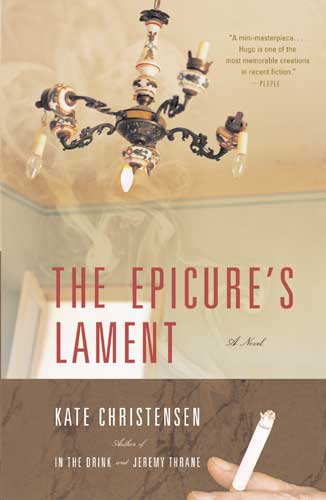The Epicure's Lament
Hugo Whittier–failed poet and former kept man–is a wily misanthrope with a taste for whiskey, women, and his own cooking. Afflicted with a rare disease that will be fatal unless he quits smoking, Hugo retreats to his once aristocratic family’s dilapidated mansion, determined to smoke himself to death without forfeiting any of his pleasures. To his chagrin, the world that he has forsaken is not quite finished with him. First, his sanctimonious older brother moves in, closely followed by his estranged wife, their alleged daughter, and his gay uncle. Infuriated at the violation of his sanctum, Hugo devises hilariously perverse ploys to send the intruders packing. Yet the unexpected consequences of his schemes keep forcing him to reconsider, however fleetingly, the more wholesome ingredients of love, and life itself.

Kate Christensen is a serious writer: Don’t be fooled by the relentless hipness or what seems full-throttle frivolity of her subject matter—the joke, if you don’t get it, is on you.
Christensen’s two previous novels (Jeremy Thrane; In the Drink) were delightfully believable, sympathetic contemporary narratives filled with wry humor and appealing protagonists. Here she ups the ante, with loftier literary aspirations and succeeds masterfully…This is an impressive tome, one that tickles the funny bone and feeds the mind.
Kate Christensen further establishes her firm grasp on Loser Lit with The Epicure’s Lament.
There is a definite scarcity of good monsters these days…This makes one appreciate Hugo Whittier, the narrator and quasi-hero of Kate Christensen’s remarkable novel The Epicure’s Lament, all the more…Christensen gives a virtuoso performance, tossing off perfect sentences seemingly at random, delivering them with a sneer that makes them more delicious.
If Christensen’s narrator inspires comparisons to Nabokov’s, I think she can stand up to them…The Epicure’s Lament is a razor dissection of the inside of a rogue’s mind, with wonderfully subtle asides into philosophy, literature and, even, food.
[A] zesty plum pudding of a novel.
Kate Christensen’s Hugo, with his talent for duplicity and the daily inhumanity, descends from a long line of cad lit—the preserver he gets, the more delicious it seems.
Unexpectedly charming in some places, absolutely dastardly in others, Hugo is an utterly unforgettable character.
Christensen has created in Hugo [Whittier] an altogether appealing, irascible antihero, along the lines of Grady Tripp in Michael Chabon’s Wonder Boys or Doug Willis in David Gates’s Preston Falls.
Christensen pulls it off… The Epicure’s Lament becomes funnier the more Hugo begins to engage with the people he purports to loath, and the more it becomes clear he’s not quite ready to leave yet. Why an author would set herself the formidable task of creating such a creature—and then convincing us to like him—is a bit puzzling, but why look a gift horse in the mouth?
A suave ego-/erotomaniac more than half in love with easeful death. First-rate adult entertainment, as they say, and Christensen’s most impressive yet.
Refreshingly dark-hearted.
Hugo’s smug and self-loathing voice that is the greatest treat of this very savory dish of a novel.
Christensen’s third novel is a mini-masterpiece about the despair of desire…an exquisite meal served in literary, haute cuisine prose. Discerning palates will savor it.
A mordantly funny chronicle of one man’s quest to enjoy a slow, decadent suicide in solitude.
Christensen creates a rich, nuanced character who surprises you at the most unexpected times…As a reader you don’t mind stepping into Hugo’s life and experiencing the world through his eyes; indeed, you’ll find yourself looking forward to it.
Kate Christensen has proven herself an expert on the dark side of comic fiction.
Funny and aesthetically playful…Christensen beautifully handles this very male point of view, with a complexity of language and a set of intricate emotions (both hidden and revealed) that recall Nabokov’s Lolita.


Brilliant Kate, the language, the observations rough, earthy, exquisite. I bought it on the basis of a lithub/Emily Temple recommendation/list of the most under-read, under acknowledged literary classics. Yours was one of only three on the list. It is firmly now on my ten favourite novels list. Hugo, what a self-centered, self absorbed, inward looking prick, but a character with few self-pretensions. My only knock, and it’s a small one, is his sexual appetite and conquests were not particularly realistic, but maybe Hugo was prone to hyper exaggeration in this aspect.